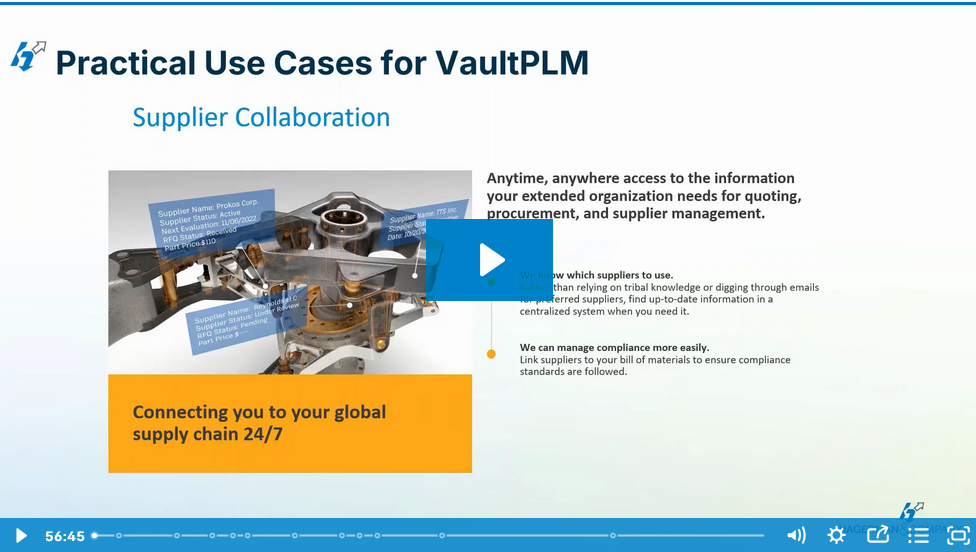Bridge the Gap Between Internal and External Teams
For manufacturers and engineers, Autodesk Vault is the central system for managing critical engineering data. It ensures version control, facilitates collaboration, and streamlines workflows throughout the entire organization.
But what happens when that data needs to extend beyond the walls of your office or internal teams? How do you securely and efficiently share vital information with field teams, contractors, and clients who can’t access, or aren’t using Vault?
Many organizations struggle with sharing data outside their internal network. Traditional methods like VPN access can introduce security vulnerabilities, while simply emailing files leads to version control issues and miscommunication. The challenges of traditional file sharing highlight a need for a more streamlined and secure approach to data sharing; enter, the Autodesk Construction Cloud.
Why Connect Vault to the Autodesk Construction Cloud?
The Autodesk Construction Cloud (ACC) is a flexible, unified, cloud-based solution that connects teams, workflows and data across the entire project lifecycle. By centralizing information in a common data environment, ACC provides seamless data sharing and collaboration with field teams and external stakeholders without access to your internal Vault. The simple process of adding ACC to your workflow provides drastic improvements and benefits:
Secure Access
Rather than granting external teams’ direct access to your Vault environment, you can selectively publish documents to ACC, allowing them to access the information needed without compromising the security of your internal data.
Tailored Document Delivery
Not every team or stakeholder needs access to the full complexity of your Vault data. Field teams may require simplified models for installation, while clients may only need specific drawings for review. Connecting to ACC allows you to curate the data you share, ensuring everyone receives the right level of data in a usable format.
Simplified Collaboration
ACC provides a user-friendly platform for collaboration, even for those unfamiliar with Vault. Field teams can access drawings and models on their mobile devices, contractors can review and approve submittals, and clients can provide feedback, all within a single centralized environment.
Streamlined Workflows
Updates made in Vault can easily be published to ACC, ensuring all teams are working with the latest information. This eliminates delays and errors associated with manual data transfer and promotes a more efficient project lifecycle. Stakeholders can easily comment on documents, request changes, and track progress within the platform, facilitating clear communication and feedback loops.
Why and What We Share
Sharing documents externally is necessary in any modern manufacturing workflows. The need to share data generally falls into three categories:
Customer Requirements
Often, contracts and customer requirements dictate how and what data must be shared, which may include submittal packages, native CAD files, simplified models, and documents needing approval and feedback.
Field Operations
When manufactured products or equipment are installed in the field, teams need seamless access to critical data. Full detailed documentation, including assembly drawings, parts lists, and maintenance guides are essential for crews installing or building on site.
Contractors and External Partners
Talent shortage is often a challenge faced by manufacturers, who often rely on third-party contractors or newly acquired subsidiaries for engineering work. These teams require a secure and efficient mode of file sharing to work effectively.
How Does Vault to ACC Work?
Synchronizing Vault with Autodesk Construction Cloud is a simple workflow to adopt for all teams:
- Vault as a Source of Truth: All master project documentation remains secure and managed within your internal Vault.
- Selective Publishing: Choose the specific Vault data to share externally. Tools like coolOrange powerSync can further automate these processes.
- ACC as Hub: Publish chosen Vault data to a designated project in ACC.
- Desktop Connector for Local Access: Stakeholders use Autodesk’s Desktop Connector to sync the relevant ACC project.
- Collaboration & Feedback: ACC provides stakeholders tools for viewing, markup, commenting, and approvals.
- Updates and Synchronization: Changes made in the field are synced back to ACC and Vault, so all documentation remains up-to-date and centrally accessible.
See the workflow in action in our webinar, Unlock the Power of Vault in the Field.
The Role of Desktop Connector
Desktop Connector acts as the bridge between your Vault and ACC. It creates a virtual drive on your computer that mirrors your ACC projects, allowing you to access, edit, and manage cloud files directly from desktop applications. This eliminates the need for manual file transfers or complex sharing workflows, and leverages ACC’s robust security features to protect your data. Access to ACC projects and files is controlled through permissions, ensuring only authorized users can view or edit specific data.
How it Works with Vault
- Publishing to ACC: Selectively publish specific folders from your Vault to an ACC project; this is essentially copying the chosen files to the cloud.
- Desktop Connector Sync: Anyone with access to the ACC project can use Desktop Connector to synchronize the cloud files to their local machine
- Local Access: Once synced, you can work with the files in your preferred applications (AutoCAD, Revit, etc.) as they are accessible on your virtual drive.
- Changes and Updates: Any changes made locally are automatically synced back to ACC via Desktop connector, and vice versa, ensuring everyone is working with the latest versions.
Desktop connector supports a wide range of file types, including CAD formats (DWG, RVT), documents (PDF, DOCX), and more. ACC maintains version history, allowing you to track changes and revert to previous versions if needed.
The Role of coolOrange powerSync
coolOrange powerSync automates the publishing of data from Vault to ACC, further streamlining the process and reducing manual errors.
Key Features
- Automated Synchronization: Schedules regular synchronization between Vault and ACC, ensuring data is consistently up to date.
- Bi-directional Updates: Enables updates to flow in both directions, from Vault to ACC and back.
- Selective Publishing: Allows you to choose which Vault data to publish to ACC, giving you granular control
Other Tools and Considerations
Vault Thin Client
You’ll need the Vault client installed on your local machine to manage and interact with your Vault data.
ACC Account
An Autodesk Construction Cloud account is required to store and share your Vault data in the cloud.
Autodesk Platform Services
Autodesk Platform Services (formerly Autodesk Forge) allows for custom integrations and workflows between Vault and ACC, enabling you to tailor the connection to your specific needs.
While Desktop Connector provides the foundational link between your local Vault and ACC, tools like coolOrange powerSync automate and further enhance the Vault-ACC connection. Depending on your specific needs and technical expertise, you can further customize the integration using platforms like Autodesk Forge.
Hagerman & Company offers a specialized implementation solution for Vault and ACC that includes customized configuration, system integration, and training to optimize workflows and maximize efficiency. Contact us today to get started.






Comments